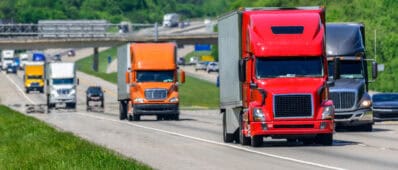Project Summary
Heavy-duty trucks are a major source of transportation-related greenhouse gas and criteria pollutant emissions. One approach to reducing the climate and health impacts of these trucks is to transition them to zero-emission technologies such as battery electric trucks (BETs). To date, BETs have been deployed mostly in drayage application. As the performance of BETs has improved in recent years, there is increasing interest in using BETs also in regional haul application. This project examines real-world activity patterns of 15 heavy-duty BETs in regional haul application using data collected from early deployments of these trucks across eight different fleets in Southern California. The results show that the BETs are typically used on routes (or tours) that are much shorter than their driving ranges. They often make one or two tours per day, and are usually charged at the end of each tour. Due to the variation in the time of day that the BETs are operated, they are charged at different times of day, spreading the charging load throughout the day. In addition, the results indicate that about half of the BET’s operations on average occur in or around disadvantaged communities, providing emission reduction benefits to these communities.
